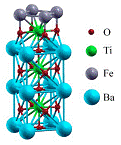Department of Physics and Astronomy: Publications and Other Research

Evgeny Tsymbal Publications
ORCID IDs
Tao http://orcid.org/0000-0001-6003-100X
Tsymbal http://orcid.org/0000-0002-6728-5480
Document Type
Article
Date of this Version
2020
Citation
npj Computational Materials (2020) 6: 172
doi: 10.1038/s41524-020-00441-0
Abstract
The Rashba effect has recently attracted great attention owing to emerging physical properties associated with it. The interplay between the Rashba effect and the Zeeman effect, being produced by the exchange field, is expected to broaden the range of these properties and even result in novel phenomena. Here we predict an insulator-to-conductor transition driven by the Rashba–Zeeman effect. We first illustrate this effect using a general Hamiltonian model and show that the insulator-to-conductor transition can be triggered under certain Rashba and exchange-field strengths. Then, we exemplify this phenomenon by considering an Ag2Te/Cr2O3 heterostructure, where the electronic structure of the Ag2Te monolayer is affected across the interface by the proximity effect of the Cr2O3 antiferromagnetic layer with well-defined surface magnetization. Based on first-principles calculations, we predict that such a system can be driven into either insulating or conducting phase, depending on the surface magnetization orientation of the Cr2O3 layer. Our results enrich the Rashba–Zeeman physics and provide useful guidelines for the realization of the insulator-to-conductor transition, which may be interesting for experimental verification.


Comments
Copyright 2020, the authors. Open access
License: CC BY 4.0 International